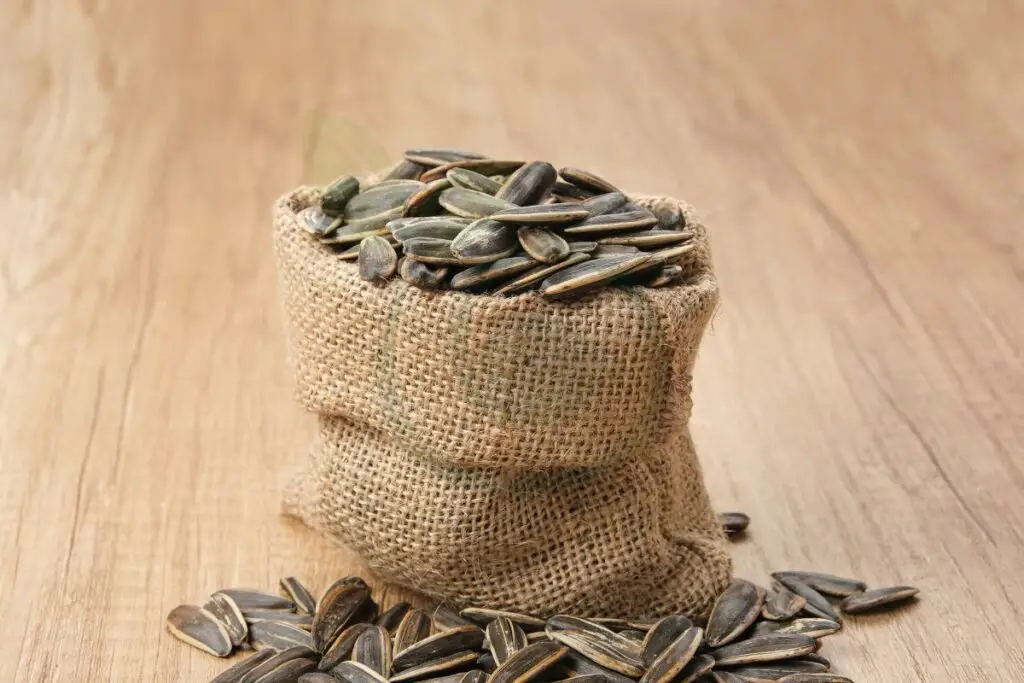Curious about whether sunflower seeds, a nutritious snack, can contribute to weight gain? Let's debunk the myth and uncover the truth behind the potential impact of sunflower seeds on your waistline and nutritional benefits. While these tiny seeds are packed with essential nutrients and offer numerous health benefits, their high calorie and fat content may raise concerns for weight-conscious individuals. By exploring the nutritional composition of sunflower seeds, including fat and linoleic acid, and understanding how they fit into a balanced diet to meet your dietary needs, you can make informed decisions about including them in your eating plan. Stay tuned as we delve into the nutritional benefits, fat, and facts surrounding sunflower seeds and their role in weight management.
Key Takeaways
- Monitor Portion Sizes: Be mindful of the quantity of sunflower seeds consumed to avoid excess calorie intake that can contribute to weight gain.
- Incorporate Sunflower Seeds Wisely: While sunflower seeds offer health benefits like providing essential nutrients, healthy fats, and fiber, eat them in moderation as part of a balanced diet.
- Stay Active: Combine sunflower seed consumption with regular physical activity to support weight management and overall health.
- Seek Professional Advice: Consult with a healthcare provider or nutritionist for personalized recommendations on incorporating sunflower seeds into your diet.
- Balance Nutrient Intake: Enjoy the health advantages of sunflower seeds while ensuring a diverse diet that includes a variety of foods for overall well-being.
- Listen to Your Body: Pay attention to how your body responds to sunflower seeds and adjust consumption based on your individual health needs and goals.
Understanding Sunflower Seeds
Nutritional Value
Sunflower seeds are nutrient-dense, containing around 160-170 calories per ounce, making them a healthy snack option. Their high protein and fiber content can promote satiety and aid in weight management. The types of fats found in sunflower seeds, such as monounsaturated and polyunsaturated fats, are beneficial for heart health.
Types of Seeds
When comparing sunflower seeds to other seeds like pumpkin, chia, and flaxseeds, sunflower seeds stand out for their rich source of vitamin E and antioxidants. They also contain essential minerals like magnesium and selenium. Sunflower seeds are versatile in recipes, adding a crunchy texture and nutty flavor to dishes.
Seed Comparison
With Pumpkin Seeds
Combining sunflower seeds with pumpkin seeds creates a powerhouse of nutrients. Both seeds are rich in healthy fats, protein, and fiber, making them an ideal snack or meal addition. Incorporating these seeds into salads, granola bars, or trail mixes boosts the overall nutritional profile.
Weight Management Insights

Metabolism Impact
Sunflower seeds contain nutrients that can positively impact metabolism by aiding in energy production. The protein and healthy fats in sunflower seeds play a crucial role in supporting metabolic functions. Research has shown that these nutrients can enhance metabolism and promote overall health.
Studies suggest that the protein content in sunflower seeds can increase metabolic rate, leading to more efficient calorie burning. The healthy fats present in sunflower seeds help regulate hormone levels that influence metabolism. By including sunflower seeds in your diet, you can potentially boost your metabolism naturally.
Weight Gain Reality
Contrary to common misconceptions, consuming sunflower seeds does not directly cause weight gain. The key lies in moderation and portion control. Sunflower seeds are nutrient-dense but high in calories, so it's essential to be mindful of serving sizes.
To enjoy the benefits of sunflower seeds without risking weight gain, consider incorporating them into meals or snacks in appropriate portions. Pairing sunflower seeds with other nutrient-rich foods can create a balanced diet that supports overall health and weight management goals.
Weight Loss Support
The protein and fiber content in sunflower seeds make them an excellent addition to a weight loss regimen. Protein aids in muscle growth and repair, which can contribute to increased calorie burning. Fiber promotes feelings of fullness, reducing overall calorie intake.
Including sunflower seeds as a snack option can help curb cravings and prevent overeating during meals. Their satiety-inducing properties make them a satisfying choice for those looking to manage their weight effectively. Incorporating small servings of sunflower seeds into your daily diet can support your weight loss efforts.
Health Benefits Overview
Immunity Boost
Sunflower seeds are rich in vitamins such as vitamin E, which plays a crucial role in boosting immune function. The presence of essential minerals like zinc further supports overall immune health. By incorporating sunflower seeds into your daily diet, you can fortify your immune system against illnesses.
Cholesterol Reduction
The phytosterols found in sunflower seeds are known for their ability to reduce cholesterol levels, promoting heart health. Moreover, the monounsaturated and polyunsaturated fats present in these seeds help manage cholesterol effectively. Including sunflower seeds as a snack or in salads can contribute to a heart-healthy diet and lower cholesterol levels.

Heart Health
Consuming sunflower seeds can significantly benefit cardiovascular health due to their nutrient profile. These seeds contain heart-healthy fats, fiber, and antioxidants that support overall heart function. By incorporating sunflower seeds into meals or snacks, you can enhance your heart health and reduce the risk of cardiovascular diseases.
Diabetes Management
For individuals with diabetes, sunflower seeds offer potential benefits in managing blood sugar levels. The nutrients present in these seeds have a minimal impact on blood sugar spikes, making them a suitable addition to a diabetes-friendly diet. Including sunflower seeds in recipes or consuming them as a snack can aid in better blood sugar control.
Additional Health Advantages
Brain Function
Sunflower seeds are an excellent addition to your diet due to their rich content of nutrients like vitamin E and magnesium. These nutrients support brain health by promoting cognitive function and reducing inflammation in the brain. Incorporating sunflower seeds into your meals can provide added benefits for optimal brain function.
Consuming sunflower seeds regularly can potentially improve memory, focus, and overall cognitive performance. The vitamin E found in these seeds acts as a powerful antioxidant that protects brain cells from damage caused by free radicals. The magnesium content in sunflower seeds plays a crucial role in enhancing nerve function and neurotransmitter signaling in the brain. By including sunflower seeds in your daily diet, you can enhance your brain's health and performance.
To maximize the benefits for brain function, consider adding sunflower seeds to your morning oatmeal or yogurt, mixing them into salads, or incorporating them into homemade energy bars. These versatile seeds can easily be included in various dishes to boost your cognitive abilities throughout the day.
Energy Boost
The nutrient profile of sunflower seeds makes them an ideal choice for boosting energy levels naturally. Sunflower seeds contain essential nutrients like protein, healthy fats, and fiber that help regulate blood sugar levels and provide a steady release of energy. By consuming sunflower seeds, you can experience sustained energy levels without the excess sugar crashes associated with processed snacks.
Incorporating sunflower seeds into your snacks or meals can help combat fatigue and keep you energized throughout the day. Whether eaten on their own as a quick snack or added to trail mixes and smoothie bowls, sunflower seeds offer a convenient way to fuel your body with long-lasting energy. Consider sprinkling them over salads or blending them into homemade granola bars for an extra energy boost.
Anemia Treatment
Sunflower seeds are a valuable source of iron, making them beneficial for individuals dealing with anemia or low iron levels. Iron is essential for producing hemoglobin, which carries oxygen throughout the body. Including sunflower seeds in a balanced diet can help increase iron intake and support overall blood health.
Specific Benefits
For Men
Sunflower seeds offer nutritional benefits for men's health due to their high content of protein and healthy fats. These seeds are rich in vitamin E, which promotes heart health and boosts the immune system. Incorporating sunflower seeds into a man's diet can support his muscle development and overall well-being.
Moreover, the presence of selenium in sunflower seeds aids in testosterone production, crucial for men's reproductive health. The fiber in these seeds helps in maintaining a healthy digestive system. To maximize the benefits, men can include sunflower seeds in their diet through snacking or adding them to salads and smoothies.
For Women

Sunflower seeds provide essential nutrients beneficial for women's health, such as folate, important for reproductive health. The high levels of omega-6 fatty acids contribute to hormonal balance and skin health in women. The presence of phytosterols supports women in managing cholesterol levels effectively.
Incorporating sunflower seeds into a woman's diet can help meet her daily nutrient requirements, especially during pregnancy or menstruation. These seeds can be consumed as a snack, sprinkled over yogurt or oatmeal, or blended into homemade energy bars for a convenient and nutritious boost.
For Hair
The nutrients found in sunflower seeds, including biotin, vitamin E, and copper, play a vital role in promoting healthy hair growth. Biotin aids in strengthening hair strands, while vitamin E nourishes the scalp and prevents oxidative stress. Copper assists in maintaining natural hair color and texture.
For external use, creating a DIY hair mask with crushed sunflower seeds mixed with coconut oil can enhance hair shine and strength. Regularly massaging the scalp with sunflower seed oil can stimulate blood flow and improve hair follicle health. Including sunflower seeds in the diet or using them topically can significantly benefit overall hair health.
Potential Side Effects
Daily Dosage
Consuming sunflower seeds in moderation is crucial for reaping their health benefits without facing any potential risks. The recommended daily intake of sunflower seeds typically ranges from 1 to 2 ounces. Moderation in consumption is key to prevent any adverse effects such as weight gain.
To ensure optimal health benefits, it's essential to maintain a balanced approach in incorporating sunflower seeds into your diet. Portion sizes should be controlled, and it's advisable not to exceed the daily recommended intake. Excessive consumption may lead to unwanted weight gain due to the high-calorie content of sunflower seeds.
Guidelines suggest consuming sunflower seeds as a snack or added to salads, yogurt, or smoothies. Frequency of consumption can vary based on individual dietary requirements and preferences. It's important to monitor your intake and adjust accordingly to avoid any potential negative impacts on your health.
Lifestyle Integration
Detox and Skin Health
Sunflower seeds are rich in nutrients like vitamin E, selenium, and zinc, supporting detoxification by aiding liver function. These nutrients also play a crucial role in promoting skin health by protecting against oxidative stress. Incorporating sunflower seeds into your diet can boost detox processes and enhance skin radiance.
To reap the benefits for detoxification and skin health, consider adding sunflower seeds to salads, yogurt, or smoothies. Their crunchy texture makes them a great topping for various dishes. You can create a mix of sunflower seeds with other nuts and seeds for a flavorful snack that nourishes your body inside out.
Pregnancy Benefits
For pregnant women, sunflower seeds offer essential nutrients such as folate, iron, and omega-3 fatty acids vital for maternal and fetal health. These nutrients support the development of the baby's brain and nervous system while reducing the risk of birth defects. Including sunflower seeds in a pregnancy-friendly diet can provide a wholesome source of nutrition.
To incorporate sunflower seeds during pregnancy, consider sprinkling them over cereals or adding them to homemade granola bars. You can also blend sunflower seed butter into smoothies or use it as a spread on whole-grain toast for a delicious and nutritious boost during this crucial period.
Inflammation Reduction
Sunflower seeds contain anti-inflammatory compounds like vitamin E and phenolic acids that help combat inflammation in the body. By consuming these nutrients regularly, you can potentially reduce inflammation-related issues such as joint pain and chronic diseases. Including sunflower seeds in an anti-inflammatory diet can contribute to overall well-being.
To harness the anti-inflammatory properties of sunflower seeds, try incorporating them into salads, stir-fries, or baked goods. You can also use sunflower seed oil for cooking or as a dressing for dishes to maximize their health benefits.
Expert Recommendations
Healthful Recipes
Sunflower seeds are versatile and nutritious, making them a great addition to your diet. Incorporate them into your morning routine by sprinkling them over yogurt or oatmeal for an added crunch. For a savory twist, try adding sunflower seeds to salads or homemade granola bars.
For a quick and easy snack, mix sunflower seeds with dried fruits and nuts for a satisfying trail mix. Experiment with baking by using sunflower seed butter in place of traditional nut butters for cookies or energy balls. These recipes provide a balance of protein, healthy fats, and fiber.
Consumption Tips
When purchasing sunflower seeds, opt for unsalted varieties to reduce sodium intake. Store them in an airtight container in a cool, dark place to maintain freshness. Choose between shelled or unshelled seeds based on convenience and personal preference.
Shelled sunflower seeds are ready-to-eat and can be enjoyed on their own or added to dishes like stir-fries or pasta. Unshelled seeds require cracking before consumption and are ideal for those who enjoy the process of shelling them as they eat. Add a handful of sunflower seeds to smoothies for an extra nutrient boost.
Closing Thoughts
Incorporating sunflower seeds into your diet can aid in weight management, provide essential nutrients, and offer numerous health benefits. Remember to enjoy them in moderation and balance them with a variety of foods for a well-rounded diet. Be mindful of potential side effects and always consult with a healthcare professional if you have concerns. Experts recommend integrating sunflower seeds into your meals creatively to maximize their benefits while maintaining a healthy lifestyle.
Keep exploring different ways to incorporate sunflower seeds into your diet for optimal health outcomes. Experiment with recipes, snacks, and meal combinations to discover what works best for you. Your journey to better health starts with small, sustainable changes that prioritize your well-being. Stay informed, stay proactive, and enjoy the goodness that sunflower seeds can bring to your life.
Frequently Asked Questions
Does consuming sunflower seeds lead to weight gain?
Eating sunflower seeds in moderation is unlikely to cause weight gain. They are nutrient-dense and can be part of a balanced diet when consumed in appropriate portions.
Are there specific health benefits associated with sunflower seeds?
Yes, sunflower seeds are rich in nutrients like vitamin E, magnesium, and healthy fats. They offer benefits such as supporting heart health, reducing inflammation, and providing antioxidants.
Can sunflower seeds be harmful if consumed excessively?
Excessive consumption of sunflower seeds may lead to potential side effects such as weight gain, digestive issues, and an increase in calorie intake. It is important to consume them in moderation.
How can sunflower seeds be integrated into a healthy lifestyle?
Sunflower seeds can be incorporated into your diet by adding them to salads, smoothies, or yogurt. They can also serve as a nutritious snack option or be used as toppings for various dishes for added crunch and flavor.
Do experts recommend including sunflower seeds in a balanced diet?
Nutrition experts often recommend incorporating sunflower seeds into a well-rounded diet due to their nutritional profile. However, it's essential to consume them in moderation as part of a diverse range of foods for optimal health benefits.
Image Source: Paid image from CANVA



